Keyword Search Statistics for your Website
To get statistics on your websites, one of the tools I want you to use is the Google Search Console. This tool records the search keyword phrases that Google assigns to your website.
Say you write become internet affiliate in a google search, this very website is likely going to be one of the answers in Google. Only at first Google adds your data to its index but it does not really give your website as a possible good choice so your website will likely be on a far away page. A page where no one will even go. (Actually, if you ever try to go beyond the first page of a search, I don’t know whether you’ve noticed, but the results tend to be worst pretty quickly, that is, the results on those other pages are likely not going to be the answer to your query.)
Knowing what Google thinks your website is about can help you tweak your website to make it better. Possibly tweaking certain things. Maybe your website is linked to a term that you consider offensive (possibly something in link with pornography, even!) In that case, you may want to edit the page(s) that include words that could make Google think that this is a good match for such searches. Remember that such changes take time to be effective so Google will continue to give such results to users over and over again until it properly refreshes all of its computers.
Google uses all sorts of caches and updates their database in a lousy way; I’m not in any way trying to be offensive here. They use a mechanism that allows for extremely large databases to be updated and it can take hours if not days for an update to be picked up by all the computers. The update will be picked up, it just takes time. It’s called lousy because contrary to SQL which gives you the correct answer right away, Google’s database systems give you the correct answer, eventually. Any time a computer is asked for an answer, it can ask its neighbors about their current version. If their version is more recent, then that version gets used and this computer version gets updated. Using such a mechanism can allow you to manage thousands of computers and update them as required without wasting time just doing so. It’s automatic but slow. Note that it’s not the exact way it is implemented, but the main concept is easier to understand this way. Google calls their database Big Tables.
If you use Facebook, you may have noticed such problems. You post a new message and then you don’t see it. It went missing. It’s somewhere, but somehow it was saved on Computer A and you were reconnected on your next access to Computer B which was not yet updated with your latest post. The result is that for a while your post seems to have been lost. These days, this happens much less, though.
Setup Your Google Search Console
There are a few steps to setup your Google Search Console.
First, I will assume that you have a Gmail Account. If not, well create one.
With a Gmail Account, you will be able to get access to the Google Search Console when logged in. Google will probably ask you to confirm that you want to create the Google Search Console account. Do that as requested.
Once you have a Google Search Console, you can see the basic homepage which is a list of all your websites. Recently, I think that the system automatically asks you to add a few websites. If not, as shown in the screenshot below, you can click the Add Property button at the top-right corner.
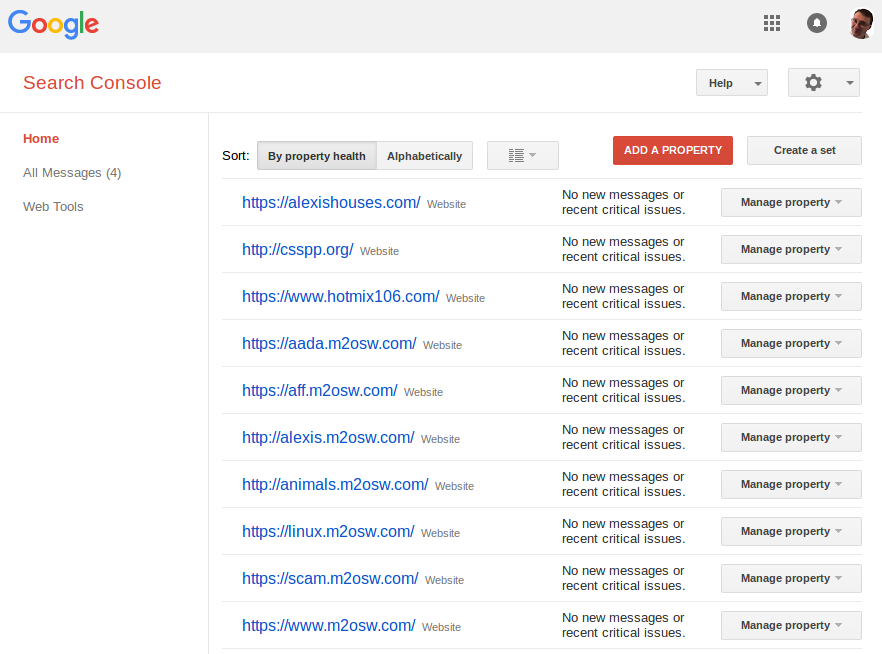
Of course, my Search Console is not empty so it may look somewhat different for you when you first create your own account.
When adding a new site (i.e. after clicking the Add A Property button,) you are going to be asked for the URL. Make sure to put the entire URL with the HTTP or HTTPS. Personally, I prefer to use that as the name as well. You’ll see that you have two entries and the name can be anything such as Becoming an Internet Affiliate.
Once you click on the Add button, you are asked to install a text file or add a meta tag to your website. With a WordPress website, it is easy to do either, although the meta tag is probably the simplest because you can do that from your website administration panel. Personally, I prefer to use the file. The reason for using the file is that Google generates one file per Search Console account. So if you have 100 websites, you just have to copy that file in the root folder of each one of your websites and voilà you will have access to the Search Console.
One problem, also, with changing the header, if you try to upgrade the theme for your website, it won’t work. WordPress won’t do it because a file was modified from the original. Either that, or it gets overwritten and you’ll lose your meta tag. That means the Search Console will be lost until you fix the header and put the meta tag in it again.
Using the File
Just after you click Add to add your new property, you are sent to a page where Google shows you a link to the file to download. Click on it and it offers you to download an HTML file.
Once downloaded on your computer, you have to upload the file to your website server.
If you have a service that offers a panel to access your website, then they may offer an upload for such special files (Google is not the only service that requires such a file, Yahoo! and Bing! also have similar verification mechanisms. So it is common for a website panel to have such functionality.)
If you do not have an access panel, then it has to be uploaded and go in your website root folder. If you’re not too sure, there is a list of files that appear in the root (you are likely to have a few more, though):
alexis@halk:/tmp/wordpress 22:15:39 $ ls -l total 188 -rw-r--r-- 1 alexis alexis 418 Sep 25 2013 index.php -rw-r--r-- 1 alexis alexis 19935 Jan 2 2017 license.txt -rw-r--r-- 1 alexis alexis 7413 Dec 12 2016 readme.html -rw-r--r-- 1 alexis alexis 5434 Sep 23 12:21 wp-activate.php drwxr-xr-x 9 alexis alexis 4096 Nov 16 00:14 wp-admin -rw-r--r-- 1 alexis alexis 364 Dec 19 2015 wp-blog-header.php -rw-r--r-- 1 alexis alexis 1627 Aug 29 2016 wp-comments-post.php -rw-r--r-- 1 alexis alexis 2853 Dec 16 2015 wp-config-sample.php drwxr-xr-x 4 alexis alexis 4096 Nov 16 00:14 wp-content -rw-r--r-- 1 alexis alexis 3669 Aug 20 04:37 wp-cron.php drwxr-xr-x 18 alexis alexis 12288 Nov 16 00:14 wp-includes -rw-r--r-- 1 alexis alexis 2422 Nov 21 2016 wp-links-opml.php -rw-r--r-- 1 alexis alexis 3306 Aug 22 11:52 wp-load.php -rw-r--r-- 1 alexis alexis 36583 Oct 13 02:10 wp-login.php -rw-r--r-- 1 alexis alexis 8048 Jan 11 2017 wp-mail.php -rw-r--r-- 1 alexis alexis 16246 Oct 4 00:20 wp-settings.php -rw-r--r-- 1 alexis alexis 30071 Oct 18 17:36 wp-signup.php -rw-r--r-- 1 alexis alexis 4620 Oct 23 22:12 wp-trackback.php -rw-r--r-- 1 alexis alexis 3065 Aug 31 2016 xmlrpc.php
Especially, you will have a file named wp-config.php which is not shown above because it is created at the time WordPress gets installed. This is the only location where the wp-config.php file appears so if you see it, you certainly are at the right place. This is where you add your Google file which then appears something like this:
-rw-rw-r-- 1 alexis alexis 53 Nov 14 03:46 google5943cac0b330c7f0.html
As I mentioned earlier. This file can be copied between all your properties. So keep it safe on your computer and you will be able to upload it again and again for each one of your websites.
Although note that you should work on one website until done (i.e. you have 30 to 40 pages of 2,000+ words each) before you move forward with your next website, if you try to build several websites simultaneously, you’re likely to lose yourself in a maze of intricate content and your websites won’t perform well for a longer period of time and that’s when you are not unlikely to feel sad that you’re not getting hits from search engines…
As Google Search Console says, you can click on the link they provide to see that the file is properly installed. It should show you the content which is a weird number (it’s hexadecimal), which is exactly what you want. It should look something like this:

If you can’t even see the verification file, then Google is not going to be able to download it either. Make sure to fix your website until you can see the content of the file. The content is not too important to you (it will be verified by Google, though) and there should be no reasons why it would be wrong. Your main problem is to place it at the right location on your web server.
Once you can see the file, click on the Verify button in the Google Search Console page (yeah, you should keep that tab open until you’re done… you can always redo the Add Property, it will get you to the same place and the file to upload won’t change, but it will be faster if you don’t close that window.)
If the button cannot be clicked, that’s probably because there is a “I’m Not a Robot” checkbox. Note that checkbox has a timeout. In other words, if you clicked it before uploading the file to your website, it may not be accepted. Just try again. As I just mentioned above, the file will not need to be changed. So you can try again without the hurdle of having to re-installing the file. You’ll have to re-install it on your server if you somehow lose it and have to reinstall everything from scratch. Otherwise, you’re set.
Using the <meta …> tag
For those of you who prefer to just edit the header and paste the <meta …> tag from the Google Search Console, there are the instructions:
- Go to your website administration area
- Click on Appearance » Editor
- By default, the editor loads your theme CSS file, on the right or below, you should have a link that says Theme Header, click on it
- Since this is the least important meta tag you’re going to add in there, I would put it last, so search for the tag that says </head> and place that Google <meta> tag just before
- Make sure to click the Update File button to save your changes
- Now return to your Google Search Console and click Verify
The <meta …> tag looks like this:
<meta name="google-site-verification" content="j8chmwqPyjv-m8ukaKBPKoF6C1fVkh7cECLSwQaZ-Os" />
This is mine, so obviously you can’t use this one. In the Google Search Console, it is called HTML Tag and it is hidden in the Alternate Method.
If you properly made the update of your header.php file, then Google should have no problem verifying your property (a.k.a. website.) if it does not work, looking at your Page Source may help you see whether your edit worked or not. In most cases, the problem comes from a missing character such as the closing “>”.
For more information about HTML tags, if you are a total beginner, I have a page about that: HTML and CSS, The Basics so You Become Dangerous.
What Not to Use to Install the Search Console Verification Code
Do not use a plugin to make this work. No. It’s not a security issue. It is safe. But it’s a huge waste. Unless you have a plugin that allows you to set the file up and then disable & remove the plugin and it still works, then great. But otherwise, it’s a waste. Each time a user is to access your website it will load that plugin.
Search Console Data
Once the verification process after adding your property (website) worked, you will have access to the Search Console for that property.
The following shows you the expected progress for your console. What should appear and how it will grow over time.
At the start… It’s empty
So… I wanted to show a few examples of how that tool looks like. Assuming you are setting it up pretty much at the same time you created your new website, it’s going to look empty for a while.
Note that even if your website existed for a while, it will look empty for a day or two. But for brand new websites it can be several weeks before Google decides what to do with your property. Be patient. I have never seen a website that did not make it in the Search Console after a little while.
The Searches will look something like this:
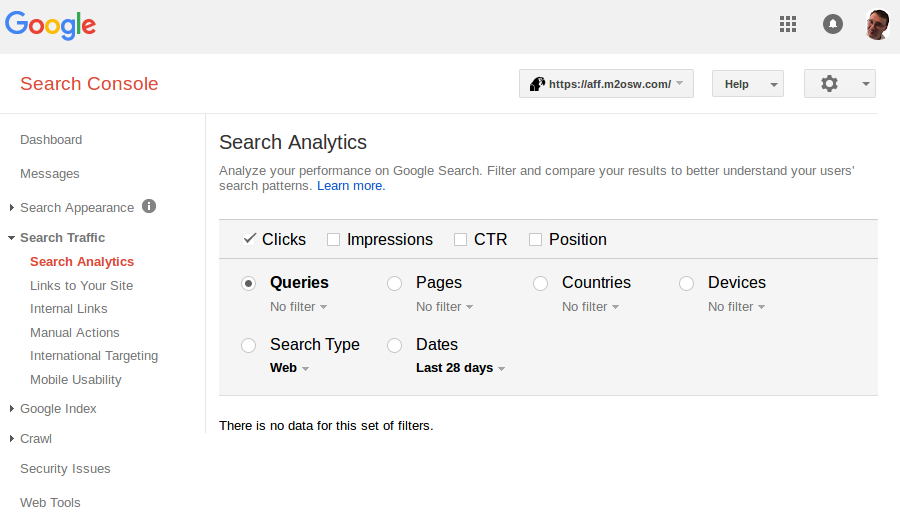
This screenshot shows that There is no data for this set of filters. As mentioned above, this means that the Search Console has not yet received data. Note also that the data is always about 1 day behind, even once it starts to show you substantial data. However, in the realm of Blogging, it really does not matter. Nothing changes so fast that it would look so different from one day to the next (unless your website gets hacked, your server is down, etc.)
After a Little While Keywords Appear
Before you start seeing clicks, you will see impressions. Although it is not unlikely to see a very few clicks as Google tests your content by sending users and seeing results, it wants to make sure it is going to be a good site and that will take time while you don’t really see any clicks.
Impressions mean Google showed some of your website pages to your potential visitors. However, the position parameter, shown in red in the screenshot, is also very important. I selected both so they appear in the list below. The best position you can get is 1. It means that people are more than likely to click on your link since it is going to be the very first on their page. Now, a position of more than 10 means you are not yet on the first page for those keywords. The best is to sit and wait, assuming your corresponding pages are long enough, otherwise, go back to your site and complete it. Remember, 30 to 40 pages of 2,000+ words is the best Niche Website you can get. Although, it’s not forbidden to update your websites once in a while (especially if there is an error or something that changed since you wrote your content), if you do that all the time—and I’m guilty as charge since do that quite a bit—you won’t find the time to do another website and another and yet another… and increase your income in various domains which is the best way to keep your income coming.
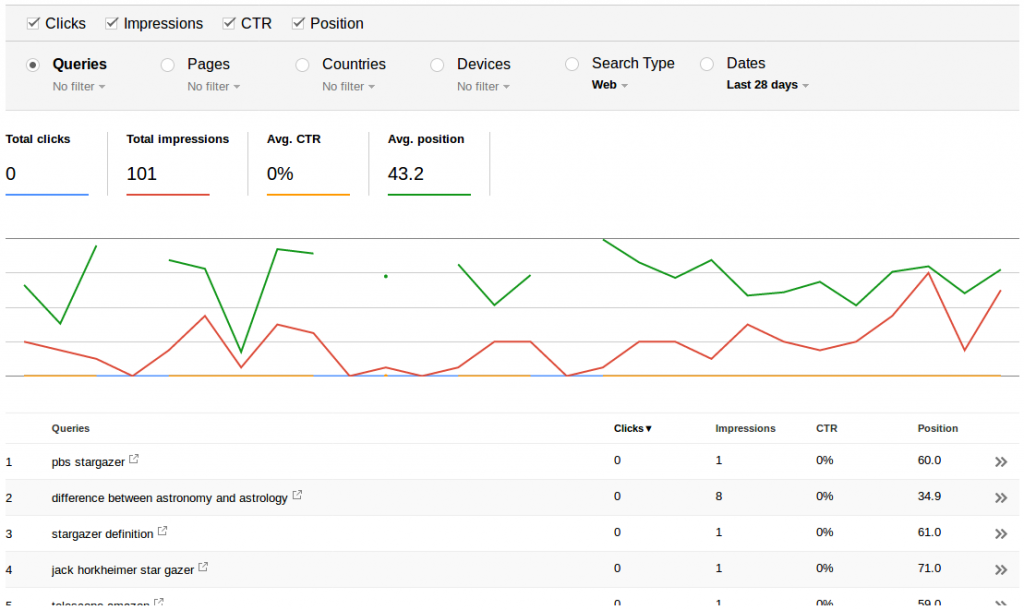
The CTR (Click-Through Rate) is going to be zero as long as you do not get clicks. So you can ignore it for a while.
As we can see in this screenshot, the main keyword at this point is Astrology and Astronomy Differences. This was my first article and it is quite long with 7,577 words (at time of writing). Yes. Longer pages, those with thousands of words are your friends. I guess I’m repeating myself here since I already told you a few times (if you’re reading my pages one after another,) but since this is the most important part of any Niche Website that generates many search clicks, I think it is extremely important to point that out over and over again until you write such long articles yourself and frankly, I can’t know when that is as I’m writing my article here! But I do hope you understand the concept and start applying it. It’s not that hard. This very page says it has 5,301 words as I’m typing this sentence.
Of course, that does not instantly give you clicks as you can see on that graph, although I have had a few clicks already for that one website even though it’s still pretty much brand new.
Did You Write Long and Useful Posts?
Next, I have a screenshot of a website which has over 30 pages of content but most are very small pages, albeit well target, pages with less than 1,000 (or even 2,000) words, are just not helping. By now, this website should be doing really good, but it only got 19 clicks in the last 28 days, which is definitely pitiful.
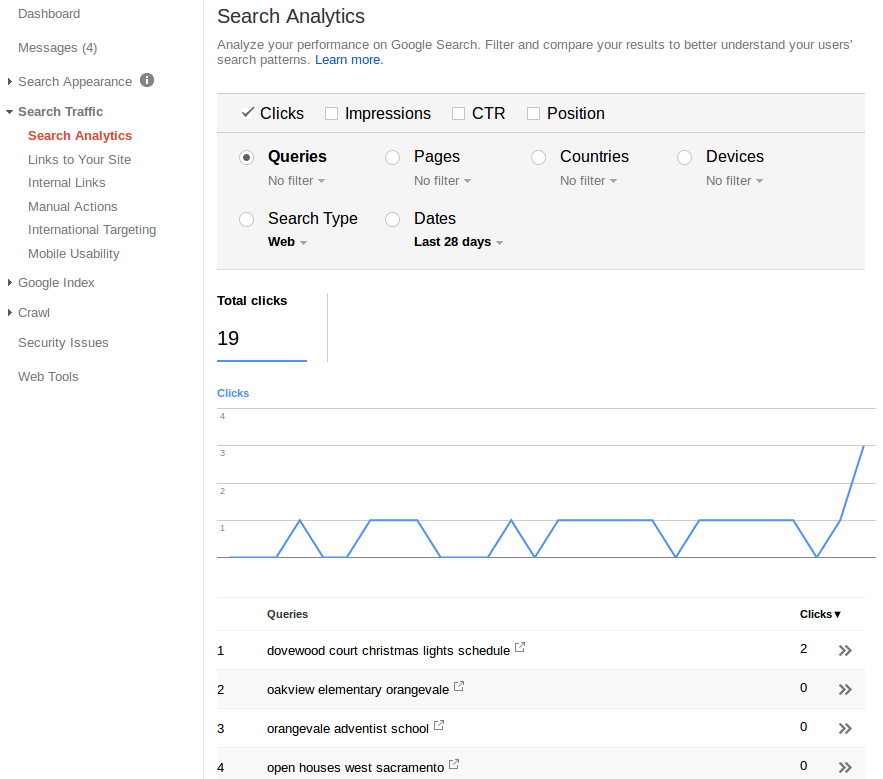
I’m working on that website and after just a few weeks, I can see that searches about the 2 new pages I added that are about 3,000 words each are having an effect. So trust me, Niche Websites with consequent data work, it’s just a matter of writing that content and being patient until you get the hits you are looking for.
Small Market, It Still Works
I love Dungeons & Dragons and my friend, Doug Barbieri, created a tool named Turn Watcher™. We have a website for it. On that website, we had a complete Tutorial and I also put a couple of online tools: a Dice Roller and a Character Generator. Our website is mainly found because of those two tools although we are pretty much the only Initiative Tracker that has been around for some 10 years… and ours is generally better.
Lately, I started working on writing pages about the Initiative Rolls in all Editions Including Fifth Edition and Dice and Hit Points. Because Hit Points are what is dealt with while in combat. That article also talks about death since it is closely related to Combat and Initiative. And the Dice are what we use to resolve attacks, damages, saving throws, and many other things and you want good quality Dice to do those rolls! You can check all those pages, you will see that the smallest is around 2,000 words. Note that’s not 2,000 characters. I clearly said words. I use the Word count at the bottom of the page in my WordPress editor and also I copy the saved content and use LibreOffice Writer. Both tools give me different counts so I like to test with both. For example, this article currently has the following two counts:
Word Press: 4061
LibreOffice Writer: 3,905
As we can see the discrepancy is over 100 words between both tools. I like to make sure that both show me at least 2,000 so I am satisfied and think that Google will also see at least 2,000 in that case.
Anyway…
Since I started writing that content, I’m seeing many more searches in link with Initiative (not shown on the screenshot, though, but they are on the first page already!) These even included some searches with the Pathfinder keyword, so I quickly changed titles, added several paragraphs, and even a couple of sections about Pathfinder. Pathfinder is like a fixed up 3.5 Edition, maybe we could call it a 3.6e. Some of the changes were actually included in 4e. So it makes sense to have it included in my content and that people would be searching for it. I did not create a separate page at this point because it is really close to 3.5e and thus it would be quite a bit of duplication.
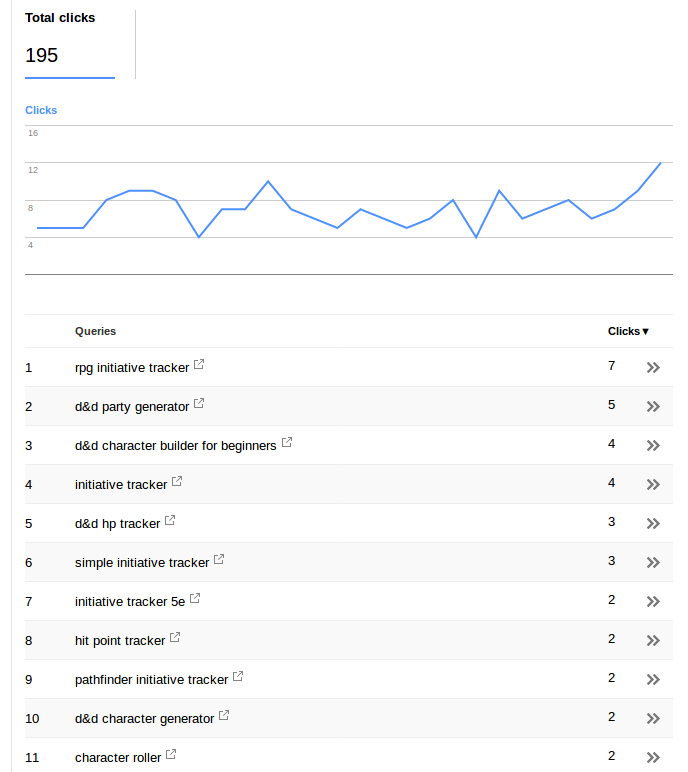
This is how you can help your website. You go to your Google Search Console and see what people are searching about and you may notice that some things send people to a certain page which is only somewhat adapted as an answer to that query. Instead, you could write a new page which references that keyword several times and thus tell Google to send people there instead and that would be a better answer.
Note that Google will take a little time to switch to the new page and it may still send people to the wrong page forever. One way to fix this problem is to send people to the new page whenever they land on the old page by adding a message at the top. For example, for my Initiative, I put Pathfinder within the page, but let’s say that I put that on a different page, I could have put a paragraph at the top of the 3.5e Initiative Page such as:
If you were looking for information about the Pathfinder version of Dungeons & Dragons, then click here.
I actually have such a message on my Ultra Initiative page because people looking for Initiative may end up in our User Guide instead of one of the Initiative page.
Sending people to the wrong page is one thing, another is to find many searches that show keywords of interest, but no clicks. If that’s something you could be writing about, then you should use that data in that way. For example, my Astronomy Website had a search keyword referencing bags used to carry your telescope. So I decided to write a section on a page just about that. The pros and cons of having such a bag and which bag is best, etc.
My Best Website (so far) Search Console
Now there is another one of my website which is doing better, although it is a Real Niche, that is, not that many people are going to search on it and plus of these most are people at work and thus not people who are going to buy anything any time soon. If you hit a really narrow market (i.e. making a few million $$$ per year) then you are not likely to get much of a share from it. Now, IT makes billions, but helping people in IT is generally not viewed as a way of making money unless you have an IT company fixing computers, but that is likely a local company and that’s not what I do. I just happen to have to fix all sorts of problems all the time and use that website to record my work to share with others and fix my own problems at times.
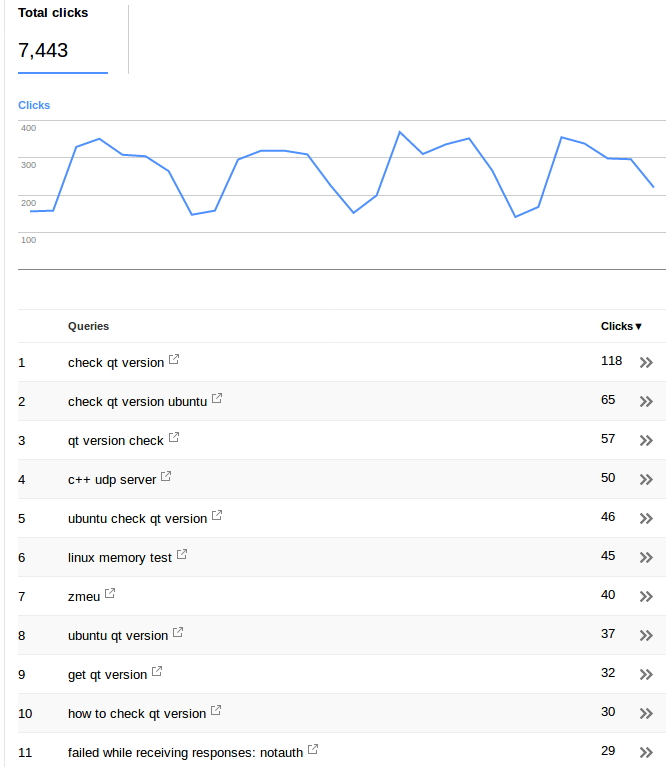
This example shows that I get between 150 and 400 clicks per day on this website. Notice how it goes up and down. It is because most people work during the week and they want to solve their IT problems during the week at work, not during the weekend when they are skying at Lake Tahoe or swimming in the Pacific Ocean in San Diego.
The number of hits still results in over 7,000 hits per months. It’s not that many, though. A better number of hits would be around 100,000 a month. Then you start seeing a lot of sales with commissions coming your way and big fat checks.
Keyword Per Page
Note that the default table shows you keywords and the number of clicks you got for them. It does not give you a total number of clicks per page.
For example, I have one page that talks about how you get the version of Qt in C++, in your Makefile, or the command line—yeah, programming stuff—but if you look closely, it matched many different searches. The main search received 118 clicks, the second one 65, the third one 57, the next one is about UDP, the 5th query is about that Qt version again, and again I got many clicks: 46, further down, we see the 8th search which is also about Qt and it got 37 clicks.
So that one page got at least 118 + 65 + 57 + 46 + 37 clicks (plus a little more further down the page) for a total of 323. It’s not practical to calculate such totals so Google offers a way to see the number of clicks on a per page basis. All you have to do is click the Page button at the top and the results are presented on a per page basis instead.
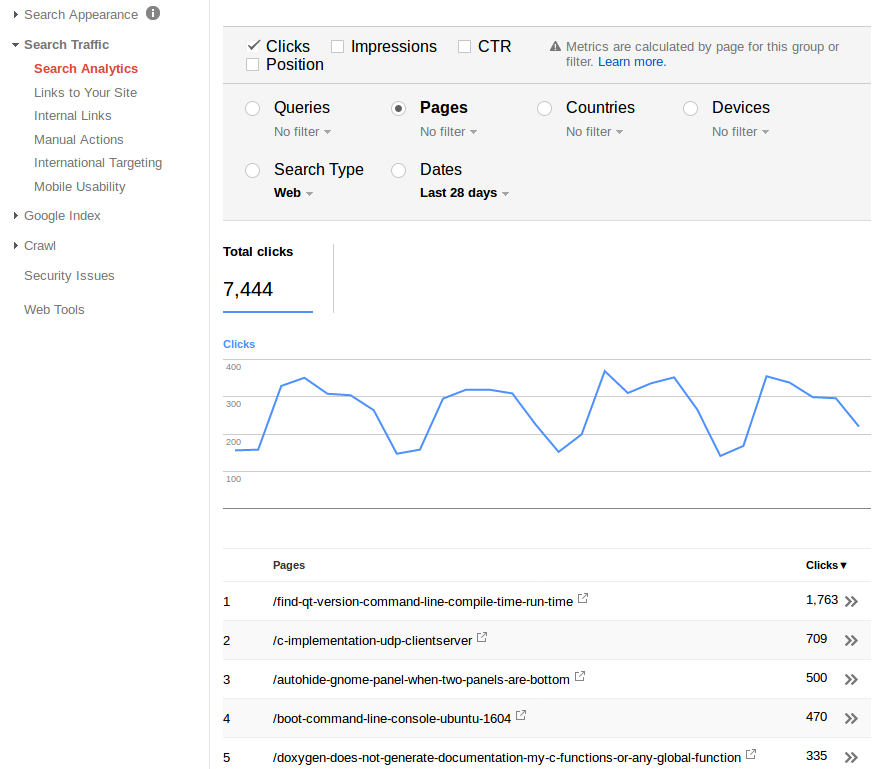
The graph itself does not change since it represents the same period of time (although we see 7,444 instead of 7,443 so I must have gotten a click between the time I took my first and second screenshots.)
Now we see the URL of my best pages. The one about Qt is first (obviously, from the previous search results, we could see that it was getting a lot of clicks) and we see that the grand total is actually 1,763 hits over those last 28 days.
We can also notice how much less clicks the other pages get (709 is 40% of 1,763, so less than half as much on that second page.)
Yet, with a total of 7,444 clicks, it represents only 23.7% of all the clicks. This is an interesting factor because it means way more pages get hits through Google than you would imagine from that very small sample we see in the screenshot. Many pages receive just 1 to 4 clicks per month. Probably better than nothing, but not really worth it, I would say.
I do not know how you can better organize your content from these numbers, but I would say that with a Niche website where you can have links to products for sale (affiliate links) you most certainly want to look into adding such links on your pages that perform the best. But make sure to do it in a smooth way, not a blatant ad in your face. I tried those before and it clearly doesn’t work. Make sure you use a link and tell people where the link takes them. Then you’re likely to see traffic appearing on Amazon or whatever other Internet Affiliate programs you’re with.
Connecting Google Search Console with Google Analytics
I already talked about Google Analytics, how to set it up on your WordPress website and how it works (as in, what it gives you.)
Now if you looked a little closer in your Google Analytics there is an Acquisition section in the menu and, under that section, you see a Search Console. This will not work until you connect both, your Google Analytics and your Search Console accounts together. You can only link one Search Console property to one Google Analytics property. However, funnily enough, Google does not offer an automatic match between URLs. You have to click on the correct property to link them together.
In order to link both accounts, the easiest I’ve found is to:
- Go to Google Analytics
- Click on your property
- In your property menu, click on Acquisition
- Under Acquisition, click Search Console
- Under Search Console, click Landing Page
- A page appears with a button “Set up Search Console data sharing”, click on it (the button may change over time, it was like that in 2017, please let me know by posting a comment if you see a change and I’ll update my page here!)
- Follow the instructions from there and you should be just fine
Note that the connection is going to take a little time. It is often that the interface won’t see it immediately. Check again after one hour or the next day. If it still tells you that the accounts are not connected, try again.
Just like I mentioned above, the Search Console data does not make it quickly. In general, it will be about one day late (contrary to most of the Google Analytics data that comes in your account in real-time.) Please don’t worry about that, it won’t make an inch of a difference.
Other Search Engines
Yahoo! (16%) and Bing! (13%) are also relatively big in the US. Google (66%) is much larger, though. If you really want to know them all, there are another two that have a somewhat significant market share: Ask (3%) and AOL (2%).
(These were the market shares as of 2016—Google has been growing!)
I think that it is clear that taking care of Google is what’s important. If that one works, the others will follow. Now if you have some time to kill, being registered with Yahoo! and Bing! is not a bad idea. They have similar tools as Google offers.
In the world, Baidu is second. It understands languages that Google is not as good at, like Russian and Chinese often making it the first choice for people speaking those languages. If you are targeting people who speak a language that Baidu supports better, then you want to use Baidu’s tools. I never used that search engine, so I have no clue what those are. I suspect some people talk about it at length.
Don’t Spend Too Much Time on Your Google Search Console
In this brief overview of the Google Search Console, I talked about what to look at. Note that I did spend quite a bit of time on the keywords and the length of your posts.
I also mentioned the concept of you working on pages that produce a lot of hits rather than pages that do not.
This is pretty much it, though. Actually, a good, well written, and well built (i.e. with links as required) Niche Website should produce results on its own without you having to look at your Google Search Console. You want to do that once in a while to see that things are working, but you should already have done a good job on your website that it will be producing no matter what anyway.
So the Search Console is used to make sure things are working as expected and help you redirect your users to the right pages, but it’s in no way a tool that should bog you down spending hours looking for things that do not exist. Frankly, even my website with 1,700+ hits on one page is not worth its weight in gold. It’s not easy to convert those hits into cash. I’ve tried and it is just not enough. What you need is a website that has pages that get tens of thousands of hits. Things that a large number of people like and will search and will share. My Linux Page content is great but it’s not the type that gets shared or where people are going to go around the website. A Niche Website, in comparison, is a place where people are going to find many pages that they like. For example, my Astronomy website has much-related pages. Much more than my Linux website (which has pages related between each other as in various pages talk about WordPress, for example, and another set talk about Microsoft Access, but the website is not one specific theme and therefore it’s difficult to use that site one way or the other.)

